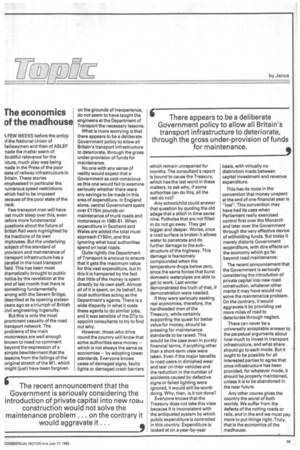The economics of the madhouse
Page 45

If you've noticed an error in this article please click here to report it so we can fix it.
k FEW WEEKS before the antics xf the National Union of lailwaymen and then of ASLEF nade the matter seem of ioubtful relevance for the 'inure, much play was being Tiede in the Press of the poor ;tate of railway infrastructure in 3ritain. These stories emphasised in particular the lumerous speed restrictions Nhich had to be imposed Pecause of the poor state of the :rack.
Few transport men will have ost much sleep over this, even Defore more fundamental questions about the future of British Rail were highlighted by the inactions of its own rmployees. But the underlying subject of the standard of provision and maintenance of transport infrastructure has a parallel in the road transport Field. This has been most dramatically brought to public notice by the revelation at the end of last month that there is something fundamentally wrong with the Severn Bridge, described at its opening sixteen years ago as a triumph of British civil engineering ingenuity.
But this is only the most prominent casualty of the road transport network. The problems of the main motorways are well enough known to need no comment beyond the expression of a simple bewilderment that the lessons from the failings of the original stretch of the Ml, which might (just) have been forgiven on the grounds of inexperience, do not seem to have taught the engineers at the Department of Transport the necessary lessons.
What is more worrying is that there appears to be a deliberate Government policy to allow all Britain's transport infrastructure to deteriorate, through the gross under-provision of funds for maintenance.
No one with any sense of reality would expect that a Government as cost-conscious as this one would fail to examine seriously whether there were any savings to be made in this area of expenditure. In England alone, central Government spent over £115m pounds on maintenance of trunk roads and motorways in 1980-81. When expenditure in Scotland and Wales are added the total must approach £150m, and this ignoring what local authorities spend on local roads.
Quite rightly the Department of Transport is anxious to ensure that it gets the maximum value for this vast expenditure, but in this it is hampered by the fact that little of the money is spent directly by its own staff Almost all of it is spent, on its behalf, by local authorities acting as the Department's agents. There is a wide disparity in what it costs these agents to do similar jobs, and it was sensible of the DTp to appoint consultants to try to find out why.
However, those who drive round the country will know that some authorities save money — which is not always the same as economise — by adopting lower standards. Everyone knows cases of damaged signs, faulty lights or damaged crash barriers
















































